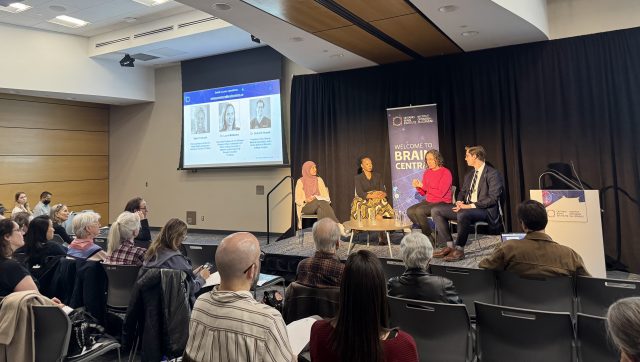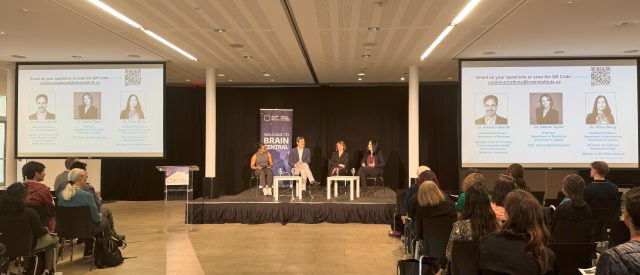At our Supporting the Elder Brain public talk in March, the final event in our 2023–24 Brain Health Across the Lifespan series, a panel of experts came together to explore a question on many minds: How can we best support our brain health as we grow older?
This thoughtful conversation wove together practical advice, personal experiences, and evidence-based insights from leaders in healthcare, research, and community advocacy.
Featured Panelists
- Ngozi Iroanyah
Director of Health Equity and Access at the Alzheimer Society of Ontario and PhD candidate in Health Policy. She brings 17 years of caregiving experience, blending professional expertise with deep personal insight. - Dr. Laura Middleton
Associate Professor at the University of Waterloo and Schlegel Research Chair in Dementia and Active Living. Her research explores how physical activity and social connection protect brain health and support people living with dementia. - Dr. Dominik Nowak
President of the Ontario Medical Association and Family Physician at Women’s College Hospital. He focuses on improving care for aging populations through primary care and public health policy.
Myth #1: Cognitive decline is part of aging
It’s easy to assume that occasional forgetfulness or slower thinking are just to be expected as we age. Laura offered an important distinction:
“It’s normal to occasionally forget where you left your keys or the name of a restaurant you visited. But if even after follow-up questions or reminders you still can’t recall important details, that’s when it might be time to speak with your doctor.”
Cognitive wellbeing – your brain’s ability to think, remember, and make decisions – is essential to living life on your own terms. While some mental changes come naturally with age, significant difficulties warrant early assessment.
Why early diagnosis matters:
- It helps rule out reversible causes like medication side effects or infections.
- It connects people to support services and community programs.
- It empowers individuals and families to plan and adapt for the future.
Myth #2: Healthcare only happens in the doctor’s office
Dominik discussed how social prescribing – a growing approach that connects people to non-medical supports that impact their health and wellbeing – is a concept reshaping how we think about healthcare.
“Social prescribing captures everything that contributes to your health beyond the hospital and the doctor’s office.” — Dr. Dominik Nowak
Social prescribing can be as straightforward as:
- Referring a patient to a community exercise program
- Helping a patient access medication coverage
- Connecting someone to a local social group that combats isolation
- Advising a patient advocate on how to access additional services
Dominik said that across Ontario, we’re beginning to see healthcare providers embrace this model. When doctors, social workers, and system navigators work together to connect patients to the right resources, it creates a fuller, more supportive circle of care, especially for older adults and those living with dementia.
Myth #3: A dementia diagnosis means life is over
Ngozi emphasized that a dementia diagnosis is not a full stop but rather a shift that opens new possibilities for support and connection. Ngozi also highlighted the importance of culturally inclusive care that honors the diverse languages, traditions, and values of all individuals.
“It can feel like a minefield to navigate… but getting an early diagnosis, connecting with healthcare professionals, and leaning on community support can make all the difference. You’re not alone on this journey. Trust me on that.”
— Ngozi Iroanyah
Resources for Dementia Support
Alzheimer Society of Ontario
- First point of contact for information and support.
- Offers a 24/7 provincial and national helpline for moments of concern (not just crisis).
- Some local societies have staff who can accompany individuals to emergency rooms to help navigate hospital systems.
Other organizations that offer services and programs for people live within the GTA area:
- Baycrest Health Sciences
- Sunnybrook Health Sciences Centre
- Mount Sinai Hospital
- Behavioral Supports Ontario (BSO)
Technology can play a powerful role in supporting individuals with dementia and those who care for them. From safety to daily routines, here are some tools and strategies that can help:
- Voice Assistants (e.g., Google Home): Helpful for setting reminders and prompts to support daily structure and independence.
- Mobile Devices & Wearables: Cell phones and smartwatches can provide peace of mind through features like location tracking and emergency alerts.
- Home Safety Technology: Devices that monitor stove usage, detect motion, or track activity can help create a safer living environment.
- Teepa Snow Resources: A renowned dementia care expert, Teepa Snow shares widely accessible strategies for caregivers through videos, webinars, and online content.
- Community Awareness & Coordination: Keeping trusted people – like condo staff, neighbours, or building managers – informed about the person’s condition can create a stronger circle of support and improve safety.
Note: Many of these devices are to assist caregivers as much as the individuals they support, helping ease the burden while enhancing quality of life.
Catch the replay of the ‘Supporting the Elder Brain’ talk on our YouTube channel
Special thanks to our event sponsor – Weston Family Foundation – for supporting this important conversation on living well with dementia and promoting brain health for all.
RESOURCES
- Report – A Healthier Canada: An Analysis of the Potential Economic and Social Impacts of Social Prescribing – socialprescribing.ca/a-healthier-canada
- Toolkit – Physical Activity and Alzheimer’s Disease – braininstitute.ca/activity-and-dementia
- Blog Post – Six Tips for Brain Health – braininstitute.ca/health-tips
- Public Talk – Sleep and Relax for Brain Health – tinyurl.com/sleep-public-talk
- Public Talk – Movement for Brain Health – tinyurl.com/movement-public-talk
- Public Talk – Eat and Play for Brain Health – tinyurl.com/eat-play-brain-health
CONNECT WITH OUR PARTNERS
- Alzheimer’s Society of Ontario: alzheimer.ca/on
- Dementia Wellness: dementiawellness.com
- Ontario Medical Association: oma.org
- University of Waterloo, Faculty of Health: uwaterloo.ca/health
- Research Institute for Aging: the-ria.ca
- MINT Memory Clinic: mintmemory.ca
- March of Dimes: marchofdimes.ca
- MOBIO Interactive: mobiointeractive.com
- Progress Place: progressplace.org



